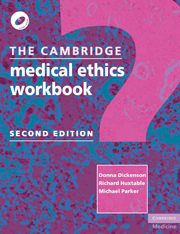Crossref Citations
This Book has been
cited by the following publications. This list is generated based on data provided by Crossref.
Bond, Tim
1999.
European developments One size fits all? the quest for a European ethic for counselling and psychotherapy.
European Journal of Psychotherapy & Counselling,
Vol. 2,
Issue. 3,
p.
375.
Birchley, Giles
2010.
What limits, if any, should be placed on a parent's right to consent and/or refuse to consent to medical treatment for their child?.
Nursing Philosophy,
Vol. 11,
Issue. 4,
p.
280.
Horn, Ruth
2013.
Euthanasia and end-of-life practices in France and Germany. A comparative study.
Medicine, Health Care and Philosophy,
Vol. 16,
Issue. 2,
p.
197.
Niveau, Gerard
Burkhardt, Sandra
and
Chiesa, Sarah
2013.
Medical confidentiality and the competent patient.
Journal of Medical Ethics,
Vol. 39,
Issue. 11,
p.
686.
Sturma, Dieter
and
Heinrichs, Bert
2015.
Handbuch Bioethik.
p.
473.
Muhaimin, Amalia
Willems, Derk Ludolf
Utarini, Adi
and
Hoogsteyns, Maartje
2019.
What Do Students Perceive as Ethical Problems? A Comparative Study of Dutch and Indonesian Medical Students in Clinical Training.
Asian Bioethics Review,
Vol. 11,
Issue. 4,
p.
391.
Zhang, Hui
Zhang, Hongmei
Zhang, Zhenxiang
and
Wang, Yuming
2021.
Patient privacy and autonomy: a comparative analysis of cases of ethical dilemmas in China and the United States.
BMC Medical Ethics,
Vol. 22,
Issue. 1,
Hein, Alice
Meier, Lukas J.
Buyx, Alena M.
and
Diepold, Klaus
2022.
A Fuzzy-Cognitive-Maps Approach to Decision-Making in Medical Ethics.
p.
1.
Meier, Lukas J.
Hein, Alice
Diepold, Klaus
and
Buyx, Alena
2022.
Algorithms for Ethical Decision-Making in the Clinic: A Proof of Concept.
The American Journal of Bioethics,
Vol. 22,
Issue. 7,
p.
4.





